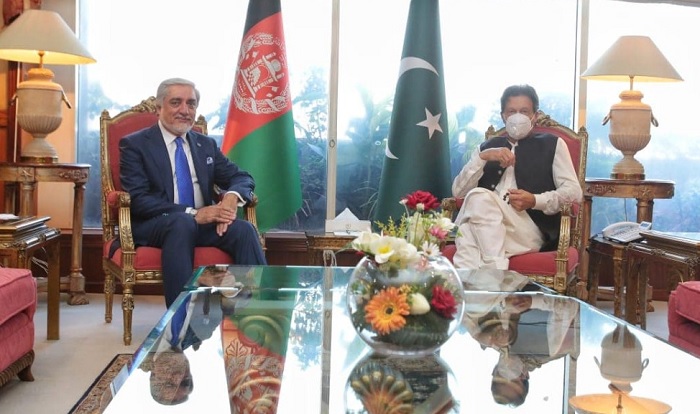Abdullah’s visit to Pakistan seen as a bid to ‘overcome mistrust of the past’

Abdullah Abdullah’s recent visit to Pakistan, as head of Afghanistan’s High Council for National Reconciliation, “reflects growing stability and mutual trust,” between Afghanistan and Pakistan, said Amina Khan, Director for the Center for Middle East & Africa at the Institute of Strategic Studies Islamabad.
In a brief, following Abdullah’s visit, published on Saturday, Khan stated that with the exception of a few brief moments of stability, the “Pakistan-Afghanistan relationship has followed a negative trajectory embedded in a vicious blame game, which has proved to be counterproductive for both countries.”
She said history has shown that whatever happens in Afghanistan has a direct impact on Pakistan and that this has been even more evident in the last two decades since the onset of the war on terror.
Khan stated that after several years of negativity, Abdullah’s visit is being viewed in Pakistan as an attempt by Afghanistan to overcome the mistrust of the past and embark on a new partnership with its neighbor.
“This will also help in Kabul gaining Pakistan’s support regarding the ongoing intra-Afghan talks,” she said.
Abdullah “solicited Pakistan’s support in convincing the Taliban to reduce, and ultimately abandon violence,” she said adding that “Pakistan has publically, as well as privately been persuading the Taliban to reduce violence and move towards a negotiated settlement with the Afghan government.”
Citing some examples of Pakistan’s efforts and involvement in the peace process she stated that Pakistan not only played a pivotal role in the short ceasefire by the Taliban in June 2018 and again over Eid in 2020, but it also encouraged the group to engage with the US in direct talks.
“These in fact resulted in the US-Taliban agreement of February 2020, and subsequently in the ongoing intra-Afghan negotiations in Doha,” she said.
Khan added that “it is important for the Afghan leadership to recognize that Pakistan is actively engaging with all stakeholders, including the Taliban in an effort to convince the group to abandon its hostilities towards the Afghan state, engage with Kabul in intra-Afghan talks and ultimately reach a compromise.”
In her brief, she stated that Pakistan’s role should be to support the peace process as well as any outcome that is achieved as long as it is Afghan-owned and Afghan-led.
“All Pakistan can do is to encourage both sides to engage and compromise. It cannot dictate peace. Therefore, it is important for both sides, particularly the Afghan leadership,to recognize and accept that achieving peace and a workable outcome that is acceptable to all stakeholders is solely in the hands of the Afghans. Indeed, it is an Afghan prerogative.”
She said for years, Pakistan has followed a policy of extending support to Pashtun groups alone – including the Taliban.
This she said “inevitably led to the alienation of other ethnic factions such as the Tajiks, Uzbeks, and Hazaras.
“This then caused these groups to view Pakistan with immense mistrust and suspicion, leading many to consider Pakistan as a spoiler in Afghanistan’s path to peace.
“Now, there is a clear and conscious awareness in Pakistan that relations need to be established with all ethnic and political groups in” Afghanistan and to “assure them of all of Pakistan’s support and sincerity,” Khan said.
Statements made by the Pakistani leadership are not only important and necessary acknowledgments, but a clear indication of the change in the narrative on the Pakistani side, she stated adding that it will however take a lot more than mere words and promises to assure Afghans of Pakistan’s sincerity.
“But the fact that Islamabad is reaching out to the different Afghan factions and not just the Taliban or for that matter the Pashtuns, warrants recognition. This is a wise and desirable policy in the right direction,” she said.
In conclusion, she stated that although the burden of history cannot be washed away easily, a pragmatic and holistic approach needs to be adopted by both to address the key issues and irritants, and that “most importantly, the positive momentum generated in recent weeks must be kept alive to foster cooperation and create systemic, institutional linkages for sustainable collaboration in all fields.”
